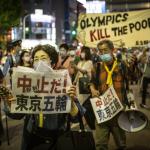Abolish the Olympics

Barely two weeks before the opening ceremony of the 2020 Olympic Games in Tokyo—already postponed a year due to the pandemic—organizers announced that spectators would be barred from most events amid a surge in Covid-19 cases. Japan’s pandemic response has largely been lauded as effective; though the country’s proportion of elderly citizens is higher than anywhere in the world, fewer than 15,000 people died. But the delta variant and a relatively low vaccination rate have fueled rational concerns about the wisdom of hosting a global sporting event.
The move amounts to a partial capitulation to widespread criticism of the summer games, such as The New England Journal of Medicine’s condemnation of the International Olympic Committee’s planned safety protocols. Meanwhile, some 83 percent of Japanese residents oppose holding the games at all, as does the newspaper Asahi Shimbun, an official Olympics partner. Not that they have much say in the matter: Only the IOC has the power to renege on a host city deal once it’s made, global health catastrophe be damned.
The irate protesters flooding the streets of Japan and the growing chorus across the world are right: Of course Tokyo 2020, as it’s still officially named, should be canceled. With only around 10 percent of Japanese people fully vaccinated and athletes traveling from countries with even lower immunization rates, it poses a dire threat to public welfare. There’s no justification for holding it. But that’s also true of every summer and winter games for decades, and likely will be until the end of time. Cancel the Olympics—for good.
Since their modern origins as a small-scale celebration of amateur athleticism in 1896, the Olympic games have mushroomed into a multibillion-dollar industry. The biannual games rake in billions in TV rights for the IOC and ad sales for Comcast and other media outlets, as well as millions more in corporate sponsorships and profits for real estate developers, hoteliers, and Airbnb. Meanwhile, the host city gets stuck with the bill for billions in infrastructure tweaks, construction, and operation costs.
As Pacific University professor Jules Boykoff, who has written extensively on the politics of the Olympics, argued in The Washington Post, there’s overwhelming evidence that the games are a financial disaster for cities: Every Olympics since 1960 has exceeded its budget, and cities and host countries are on the hook for cost overruns—a loss rarely recouped by the eventual influx of revenue so enthusiastically touted by elected officials as the reason to place an Olympic bid in the first place.* One recent study found that since 2007, the games cost $12 billion apiece in sports-related costs alone—including event security, medical services, catering, and the construction of stadiums and Olympic Villages—not to mention up to several times as much for road and transit improvements, hotel expansion, and whatever else is needed to accommodate “the largest, highest-profile, and most expensive megaevent hosted by cities and nations.” If a Japanese government audit is correct, Tokyo 2020 will come out to $28 billion, almost four times its original budget of $7.5 billion.
Local residents fortunate enough not to be evicted for their city’s Olympics can expect a spike in policing, as money pours into “security” and ultimately erodes the social fabric of communities subjected to it: In The New York Times’ telling, Los Angeles 1984 ushered in “the largest and most expensive [security net] ever imposed on a peacetime enterprise.” As Dave Zirin argued in The Nation, that unprecedented militarization fueled gang sweeps and crackdowns in the city’s poor and historically Black neighborhoods, possibly accelerating conditions that led to the riots after the beating of Rodney King.
And for all that money and suffering, what do we get? A huge blowout every two years for cosmopolitan elites—right down to contractually demanded cocktail parties feting the IOC!—and some 15,000 athletes, more of whom will resort to crowdfunding their trip to the games than will ever end up on a Wheaties box. When the events aren’t held in the wake of five million deaths from a novel respiratory illness, a few million fans get to crowd into soon-to-be-idle stadiums that hundreds of workers may have died to build.
The rest of us get two weeks of decent TV. While some of the world’s largest corporations hawk their wares, media sycophants will uncritically peddle narratives so saccharine I’m embarrassed on behalf of anyone over 10 who falls for them. “Can Japan’s ‘Recovery Olympics’ heal Fukushima’s nuclear scars?” NBC News asked with a straight face. Give me a break! Tokyo 2020 is not a redemption parable. It’s a corporate cash cow that violates public health guidelines and which five out of six Japanese citizens don’t want to happen, all because of contracts signed by their government 12 years ago that no one ever voted on.
* A previous version of this story misidentified Jules Boykoff’s university affiliation.
Natalie Shure is a writer and researcher in Boston. Her work focuses on history, health, and politics.
